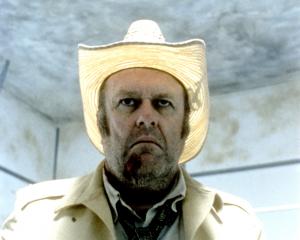
It’s an apocalyptic battle that will determine the dominant species — human or ape.
Following the success of Rise of the Planet of the Apes (2011) and Dawn of the Planet of the Apes (2014), War for the Planet of the Apes, the third and final instalment of the man-versus-primate reboot, sees beloved chimpanzee Caesar take on the human race in all-out war.
Director Matt Reeves continues to move the story through Caesar’s perspective, performed by Andy Serkis, who reprises his role as the iconic chimp via motion-capture technology.
Apes is not merely another action blockbuster serving purely as entertainment; it also carries a subversive message. Reeves, who co-wrote the script, holds a mirror to our own society, bombarded as it is with horrific and tragic images on a daily basis.
"We’re animals and we often forget that and how we fit into the planet. The whole idea of doing a war movie is to look into our nature and look at our capacity for destruction and creation, and see how those two things are in opposition," Reeves said.
"Of course, that has relevance today and has relevance to the history of humankind. That is the context in which it was written. It was intentional to reflect our struggles, our own failings, and also, hopefully, the path through that."
The parallels between our current political climate of escalating racism and xenophobia and Reeves’ script are evident.
"The danger of the world we live in, I think, is this inability for us to see each other as one. If you are moved by the story, you can understand that it’s all about empathy," Serkis concurs.
"The more I see of what’s going on in the world and when I think about Caesar’s journey, we are on the brink of becoming a species that is unable to empathise with ongoing situations and events that are so bleak."
Woody Harrelson plays against type as the ruthless Colonel J. Wesley McCullough, "The Colonel", a wannabe dictator and the apes’ nemesis, obsessed with eliminating Caesar and his tribe, enforcing humanity as the dominant species. The storyline is constructed as a Western in many ways, with the apes representing the Indians.
"I see it as a classic Western thematically, and you can feel that in the writing, which is inspired by [the novel] Heart of Darkness. Also, I don’t think there are any coincidental themes that relate to what is going on in the world. I do think that we are living in apocalyptic times," Harrelson said.
The evolution of the franchise also brought outside locations to the film — it was shot in Vancouver and in the Kananaskis Range in the Canadian Rockies — versus the original movie, which was mainly shot on a soundstage. The cast also includes Steve Zahn, Karin Konoval, Gabriel Chavarria and Amiah Miller, who plays a human child who becomes the linchpin between the apes and mankind. The franchise most definitely sits on the shoulders of Serkis’ Caesar, an ape Moses and mythical leader of biblical proportions.
"Andy Serkis’ performance is what draws you in, and the three films are quite different in Caesar’s trajectory," Reeves said.
"He’s been through a very dramatic journey, from being a no-one and a revolutionary in Rise, a leader in difficult times in Dawn, ultimately becoming a seminal figure in ape history. In War we have made him an ape Moses, so that apes in the future would look back and say, ‘Without him we wouldn’t be here’."












